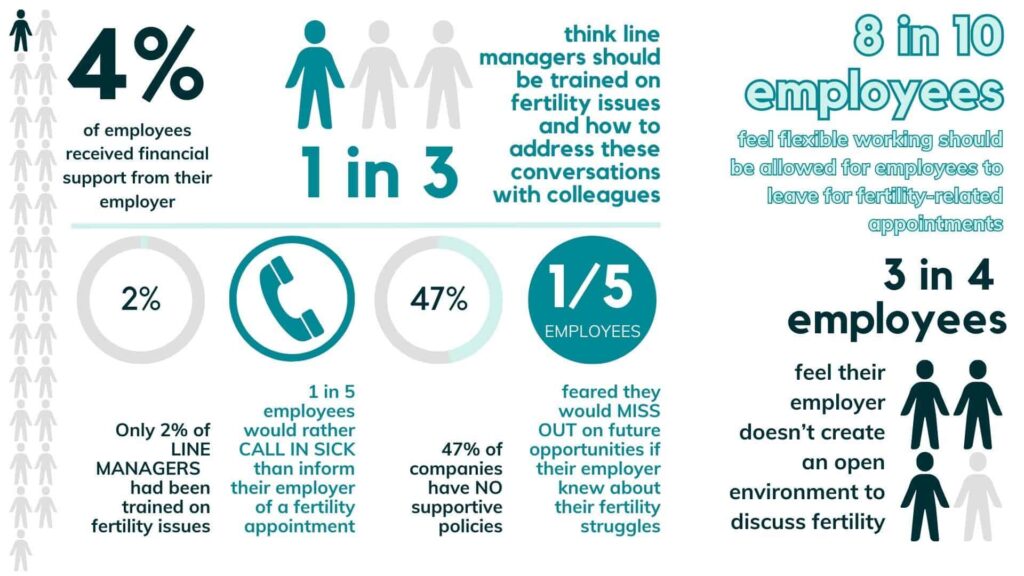If using this data, please credit with a reference link to “experts supporting those trying to conceive, Fertility Family”, or a link back to this report page. If you would like to republish any of the graphics used in this content, please get in touch and we will send you an embed code.
Having children is simply a natural part of life for many people. So it hurts all the more if a couple finds that they’re struggling to conceive. And to make matters even more stressful, there’s often no policy at work to be able to work around fertility treatments. No time off for fertility-related appointments or invasive procedures. No time off for fertility treatment side effects (often debilitating). So women find themselves choosing between their job and trying for a baby.
Both men and women often feel shame and secrecy as a part of infertility stigma. In about half of cases of infertility the issue lies with the man. But although men take time off work too, it’s generally the woman who has to suffer the invasive procedures and juggle more time off.
Women deserve more respect than this, but the law currently doesn’t support women in this position. There’s currently a Bill trying to get through parliament to give employees a statutory right to take time off work to attend fertility clinic appointments. The second reading was on March 24 and the results are currently ‘in progress’.
Meanwhile, according to a new report from WHO, 1 in 6 people worldwide are affected by infertility, with infertility in the UK on the rise. Our survey aimed to see if such a common issue is taken into account in the workplace. Our Fertility Family survey gathered insight from 248 UK employees who’ve experienced difficulties in the workplace as a direct result of their fertility journey. In this way, we gain more insight into their fertility experiences and support in the workplace.

Key findings
- 3 in 4 people feel their employer doesn’t create an open environment to discuss fertility
- 1 in 5 people feared they would miss out on future opportunities if their employer knew about their fertility struggles
- Only 1 in 25 people (4%) received financial support from their employer
- 1 in 5 employees would rather call in sick than inform their employer of a fertility appointment
- 47% of companies have no supportive policies for employees struggling with fertility
- Only 2% of line managers (1 in 50) had been trained on fertility issues and how to address these conversations
- Almost 8 in 10 employees feel flexible working should be allowed for employees to leave for fertility-related appointments
- 1 in 3 (36%) feel line managers should be trained on fertility issues and how to address these conversations with colleagues
Reality check: employees feel forced to lie at work to save their job due to the closed culture around fertility
Infertility continues to be a stigma in the workplace, making a major impact. The survey found that employees worry that they’ll lose out on their careers if they’re open with their employer about time off for fertility treatment (and potential future maternity leave which could be seen as the ‘elephant in the room’).
1 in 5 employees surveyed feared they would miss out on future opportunities if their employer knew about their fertility struggles. This is because they might worry that their employer would think their mind isn’t fully on the job, or that additional sick leave as a result of treatment side effects or time off for appointments will mean they won’t be able to do their job effectively. This is compounded by the potential for further time off for maternity leave which normally wouldn’t be communicated at such an early stage.
Many employees want this to be a private, personal matter due to this infertility stigma. They can feel as if the employer won’t fully understand the emotional and physical demands and trauma that can result from infertility treatment. They might also be concerned that confidentiality could be breached.
This creates a closed culture where employees feel they have to lie about health issues. 3 in 4 people surveyed feel their employer doesn’t create an open environment to discuss fertility, so what choice do conscientious employees have? They find themselves having to sneak around during their lunch breaks or find reasons for missing work for an appointment.
Financial pressures
Many couples will also be going through some financial strain as a result of infertility. There’ll be pressure to keep working to pay bills for fertility treatments. For example, IVF is only available on the NHS if certain criteria are met. But yet our survey found that only 1 in 25 people (4%) get financial support from their employer.
A widespread stigma
This closed culture is far-reaching, affecting both the youngest and the oldest age groups. 18-24 year olds were the age group most likely to worry that their fertility struggles would be dismissed (60%). While 1 in 4 35-44 year olds surveyed feared they wouldn’t be promoted or would miss out on future opportunities if their employer knew they were trying for a baby.
A closed culture in the workplace is further demonstrated by employee expectations around fertility appointments. Preconception care is currently not a statutory right in the UK, so relatively few work environments have formal policies in place to support people having treatment. Due to this, 1 in 5 employees surveyed would rather call in sick than inform their employer of a fertility appointment.
Interestingly, more men than women would rather call in sick than tell their employer they’re going to a fertility appointment, perhaps due to a male stigma, a focus on women when it comes to fertility issues, denial, or feelings of emasculation or grief. And out of the employees surveyed, those aged 45-54 were more likely to call in sick than tell their employer that they’re going to a fertility appointment (44%) — possibly due to being in a position of authority, with the expectations that brings.
Delaying starting treatment due to infertility stigma
Companies’ closed culture has directly impacted employees’ fertility struggles and the fundamental decisions they make. Sadly, only 1 in 4 of those surveyed felt that their company understood and supported them. And 1 in 8 employees (13%) felt the need to delay the fertility journey until they were in a senior role for financial reasons. Shockingly, 1 in 16 employees (6%) felt the need to delay their fertility journey until they were in a senior role so they would be ‘taken seriously’ by the company. Delaying huge life-changing decisions like these impacts the success of fertility treatments as success rates go down with age.
Issues at every level
Employees’ closed culture experiences are also felt at a micro level in their relations with management and colleagues:
- 1 in 7 (15%) felt their struggles were dismissed by their manager.
- And of the employees surveyed, 1.5x more likely to feel uncomfortable discussing fertility struggles with colleagues than they are comfortable.
Even on a one-to-one level, employees aren’t getting the support they need because they don’t feel they can be open. Unless someone in senior management champions a fertility treatment policy and increases awareness then it won’t filter down to lower levels and employees won’t feel empowered to be able to talk about it.
Do employees feel supported by their workplace?
Looking at the survey data, it’s clear that infertility stigma is not helped by closed company cultures, but it’s also reflected in the lack of support and policies.
No support network
The survey found that employees experienced little to no support from their employers whilst experiencing fertility issues:
- Less than half of companies have no supportive policies for employees struggling with fertility (and only 16% of companies have supportive policies).
- 40% of people received no support at all from their employer.
- And women surveyed are more likely to not receive any support from employers whilst experiencing fertility issues (42% women vs 30% men).
Nowhere to turn to
This absence of support is further reflected in the lack of training and counselling around fertility issues:
- Only 2% of line managers (1 in 50) had been trained on fertility issues and how to address these conversations.
- Only 3% of people received counselling whilst struggling.
Inflexible leave policies
The lack of support is also demonstrated in employers’ leave policies:
- Only 1 in 4 people received compassionate leave or paid time off for fertility appointments.
- Men (37%) are more likely to receive paid compassionate leave / paid time off for fertility appointments than women (22%).
- 1 in 3 people had to take more than a week off for fertility-related reasons.
- Women (35%) are two times more likely than men (15%) to have to take more than a week off work for fertility-related reasons (appointment, illness from medication, mental health issues and fertility).
For employees that did receive support during their fertility struggles, 35-44 year olds were the age group that is most likely to feel supported by their managers (10%), with younger age groups feeling more dismissed.
How do different sectors support employee fertility challenges?
Our Workplace Infertility Stigma Survey also collected data on the common sectors: healthcare, teaching and education, public services and administration and accountancy, banking and finance. And there are some pretty grave statistics. For example, just a third of healthcare employees (32.3%) and under a quarter of teaching and public sector employees felt their fertility struggles were understood and felt supported by their company. Let’s take a closer look…
The healthcare industry
You might think that the working healthcare industry would make things easier, but the infertility stigma still makes a major impact:
- Less than 2% of healthcare sector workers feel supported by their company during their fertility journey.
- Over half of the healthcare sector employees are uncomfortable talking to colleagues about their fertility.
- 1 in 4 (24.6%) healthcare sector employees didn’t tell their employer as they worried their fertility struggles would be dismissed.
- 1 in 5 healthcare employees are more likely to call in sick than tell their employer about their fertility appointment.
In fact, over a third of healthcare employees stated they didn’t receive any support from their employer whilst experiencing fertility issues
The teaching industry
When compared to other sectors: the teaching sector was most comfortable talking to colleagues about fertility (40%).
This may be because ¾ of school teachers are women. Women are more able to talk about their feelings and it’s less socially acceptable for men to (with negative consequences on men’s mental health — compounded by a lack of male infertility support groups). There’s also more likely to be a deeper understanding about the invasive procedures, the physical side effects and the impact on a woman’s body in a female-dominated working environment.
However, this increased ease within the teaching industry stops at a higher level:
- Employees are most likely to call in sick than tell their employer about their fertility appointment in the teaching and education industry (23.3%).
- And 10% of employees in the teaching sector waited until they were in a senior role before they considered starting a fertility journey to ensure they were ‘taken seriously’ by their employer.
The public services and administration industry
The public services and administration industry ought to lead by example, but this isn’t the case:
- Over half of public services sector employees are uncomfortable talking to colleagues about their fertility.
- Over a quarter (27%) of public service sector employees feared not being promoted or missing out on future opportunities if their employer knew they were trying for a baby.
The accountancy, banking and finance industry
This is an industry which can be known for being old-fashioned, so perhaps this image adds to an employee’s concerns. Employees in the finance sector were most likely to fear not being promoted or missing out on future opportunities if their employer knew they were trying for a baby (32%). And 15% of employees surveyed who work in the finance sector waited until they were in a senior role before they considered starting their fertility journey to ensure they were ‘taken seriously’ by their company.
On the flip side, perhaps due to a more formal structure, HR and working environment — with a strong focus on confidentiality and procedure — those surveyed who work in the finance sector are most likely to inform employers about fertility struggles. 42% said their employer had created an open environment where they felt comfortable discussing their fertility struggles. And over half (53%) reported they’d be given time to go to fertility appointments.
Although those surveyed in the finance sector experienced ‘no support’ from their colleagues, it’s the industry that experiences the most support from line managers (over 10%). This is perhaps because, in a more formal working environment, colleagues simply wouldn’t know about any fertility struggles as there’s less opportunity for discussing personal matters — that information would be kept confidential with a line manager as a means to fit work around appointments.
What can employers do to support their employees?
More needs to be done to support employees who are struggling with their fertility. Taking the findings of our Workplace Infertility Stigma Survey into account, this is a list of actions that employees want from their employers, in priority order:
- Provide flexible working to allow employees to leave for fertility-related appointments (77%)
- Provide paid compassionate leave (58%)
- Provide financial support for employees undergoing fertility treatment (41%)
- Organise line managers to receive training about fertility issues and how to address these conversations with colleagues (36%)
- Provide fertility counselling for employees who are struggling with their fertility (34%)
- Organise for all employees to receive training about fertility issues and how to address these conversations with colleagues (23%)
- Provide mental health training to all employees (21%)

Our survey findings identified these key areas that employers should consider for those who are on their fertility journey:
✔ Financial support. 40% of respondents feel financial support should be provided.
✔ Flexible working. Almost 8 in 10 employees feel flexible working should be allowed for employees to leave for fertility-related appointments.
✔ Training. 1 in 3 (36%) feel line managers should be trained on fertility issues and how to address these conversations with colleagues.
✔ Counselling. 1 in 3 (34%) feel counselling should be provided for employees who are struggling with their fertility.
Employers need to take action now
The impact of workplace infertility stigma results in conscientious employees being forced to lie, encouraged to delay starting a family — and potentially having to choose between fertility treatment and their job. Added to this, the stress of workplace infertility stigma will impact employees’ physical and mental health (and this, in turn, could impact their work). The survey shows exactly how employers need to make their workplaces more supportive and flexible for people going through fertility treatment — and the action needs to be taken now, without waiting for any legislation to be passed.








